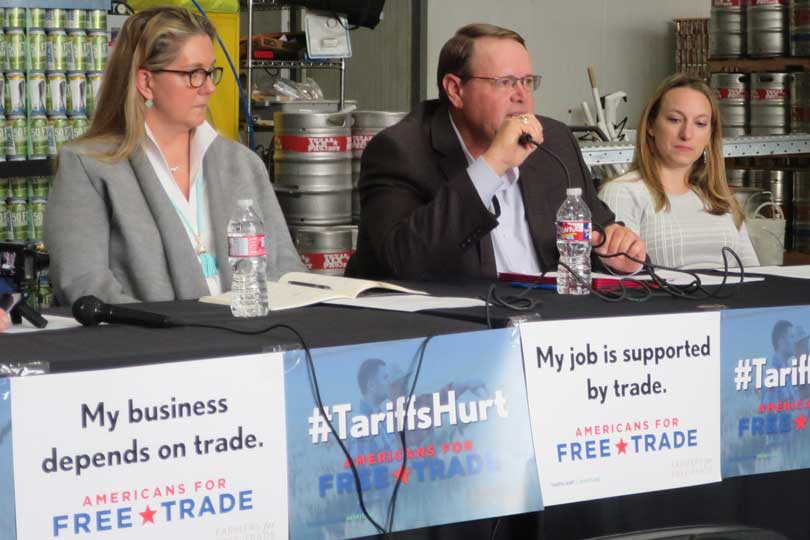By Gary Joiner
TFB Radio Network Manager
Agriculture is bearing the brunt of trade retaliation at a time when farmers are already facing low commodity prices, high input costs and unpredictable weather. And tariffs are having a negative impact on agriculture.
That was the message delivered by Texas Farm Bureau (TFB) Secretary-Treasurer Scott Frazier at a Tariffs Hurt the Heartland town hall event in Dallas Oct. 18.
The event was sponsored by Americans for Free Trade and Farmers for Free Trade, of which TFB is a member.
“While we support the Trump administration in its efforts to level the trade playing field, farmers and ranchers, like me, have concerns about the repercussions from the decision to place tariffs on trading partners,” said Frazier, who grows cotton, grain sorghum, corn and wheat and raises beef cattle in Nueces County.
U.S. net farm income has dropped 52 percent over the last five years, making it tough for farmers to continue operating.
One quarter of the agricultural products grown in the U.S. are exported to other countries. In 2017, the U.S. exported more than $140 billion of agricultural products worldwide.
“The economic well-being of American agriculture depends on maintaining and strengthening our export markets. Farm and ranch families depend on this in order to survive,” Frazier said.
A new report by The Trade Partnership and released by Tariffs Hurt the Heartland indicates the amount of tariffs paid nationwide in August 2018 increased by $1.4 billion, or 45 percent, as compared to tariffs paid in August 2017.
Tariff costs in Texas more than doubled from $161 million to $424 million, according to the report.
“Since the tariffs have been imposed on Canada, Mexico and China, we have seen the markets react negatively. On our farm, we rely on trade markets to sell our sorghum, corn, cotton and beef,” Frazier said. “While I appreciate the Trump administration for its work to hold other countries accountable, I hope no long-term damage is being done.”
Frazier said TFB commends the Trump administration for working on important trade opportunities and creating fairness for the U.S. in current trade pacts.
“These efforts have proven effective, especially as we look at the modernized NAFTA agreement. We are pleased the United States Mexico Canada Agreement (UMSCA) expands market access for Texas agricultural products,” Frazier said.
He noted the trade situation needs to be resolved quickly in order to focus on the long-term outlook of making better trade deals, like the administration did with UMSCA.
Other participants in the town hall event were Angela Marshall Hofmann, co-founder of Farmers for Free Trade; Kat Thompson, founder and CEO of the Texas Ale Project; Tiffany Melvin, president of North American Strategy for Competitiveness, Inc.; Robert Gardner, founder, president and CEO of Joovy; John Gonzales, director of U.S. Chamber of Commerce, Congressional and Public Affairs, Southwest and South Central Region; and Tiffany Williams, owner of The Luggage Shop of Lubbock.

